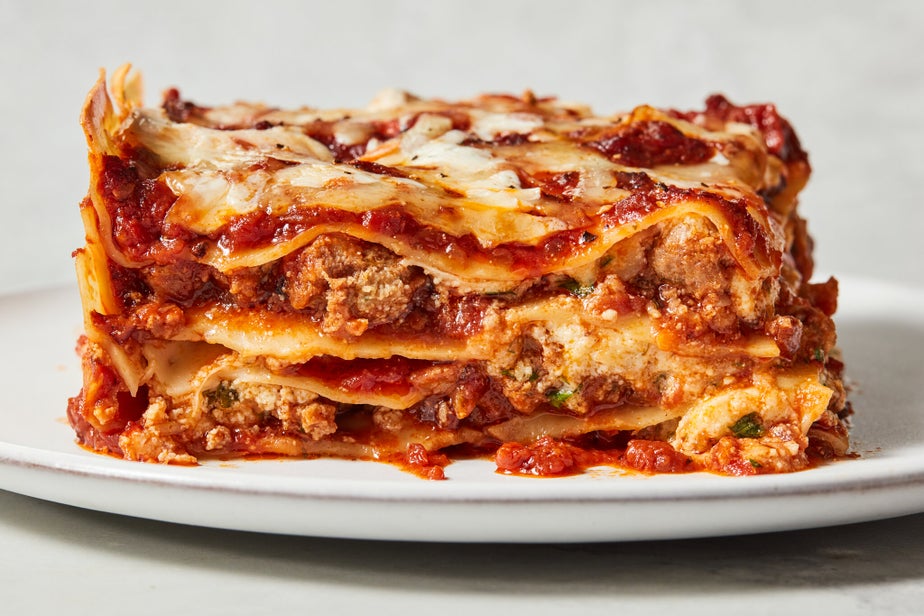 We were making frozen lasagna the other day. The kind that you just stick in the oven for 60-75 minutes and dinner is ready. But do you take it out at 60 minutes? 65? 70? In my experience, those lasagnas always take longer than the high end of what it says on the packaging, yet for us, it’s still a minimum 30 minute process of taking it out of the oven to check, letting the hot air in the oven pour out, putting it back in and repeating that process 5 times (with a cooler oven) until you’re sick of waiting and just take it as is whether done to perfection or not. Really, it would be best to be patient, give it the full 75 minutes and then a few extra outside the oven to simmer before judging whether or not it’s ready to eat. Put it in the oven once, take it out once and make just two trips to and from the kitchen from start to finish. It would be much faster that way, and all you have to do is wait a little longer.
We were making frozen lasagna the other day. The kind that you just stick in the oven for 60-75 minutes and dinner is ready. But do you take it out at 60 minutes? 65? 70? In my experience, those lasagnas always take longer than the high end of what it says on the packaging, yet for us, it’s still a minimum 30 minute process of taking it out of the oven to check, letting the hot air in the oven pour out, putting it back in and repeating that process 5 times (with a cooler oven) until you’re sick of waiting and just take it as is whether done to perfection or not. Really, it would be best to be patient, give it the full 75 minutes and then a few extra outside the oven to simmer before judging whether or not it’s ready to eat. Put it in the oven once, take it out once and make just two trips to and from the kitchen from start to finish. It would be much faster that way, and all you have to do is wait a little longer.It’s funny that waiting longer can make eating lasagna faster and easier. Trying to rush a process rarely makes a process faster. Personally, I loath being in a rush. I’d rather be in a pickle than be in a rush. When you’re in a rush, you’re thinking more about the timeline than the task at hand, therefore you have a hard time giving the task the attention it more often than not needs. If I try to rush the process of cleaning up my lasagna and associated dishes, I may save myself 90 seconds, but I may also break a dish and I may also have to mop the floor and clean the entire counter top too. If I don’t rush, I take my time and clean and put things away without even thinking about the timeline, it takes me 90 seconds longer, but when I’m done I’m done, and in the morning I have the same number of non-broken dishes.
I like to call it the 1.5 second rule. Always take an extra one and a half seconds to complete simple things around the office, the house, the car or the computer. Things are less likely to get broken, you’re less likely to hurt yourself, less likely to be in an accident and less likely to make an untimely mistake. It applies to everything. Before I lift the bar off the rack to squat, I take an extra 1.5 seconds to make sure my hands are in perfect position. Before I send a 7 word text, I take an extra 1.5 seconds to make sure it actually says what I want it to without any confusing typos. People, take an extra 1.5 seconds to look around before you pull out of your parking spot. It’s so simple, but it requires you to not be in a rush.
For some reason, we place a high value on speed to complete tasks. I think speed should be replaced with efficiency. Being fast doesn’t necessarily mean being efficient, but being efficient is nearly always fast. There’s a saying used by many in business (not that many unfortunately) and even in the Navy Seals that reads “slow is smooth and smooth is fast”. Put differently, fast isn’t good unless it’s smooth, and smooth is slow. The point is this: take an extra moment to do everything you do. What’s your hurry? The Tasmanian Devil is super fast, but he leaves a terrible mess behind him everywhere he goes. Being fast down a straightaway means nothing for a Formula One driver if he can’t be smooth around the turns.
It’s one of those counter intuitive ideas that you have to observe to buy in to. Let me tell you this, you don’t see the fittest people in the gym doing the 20 minute HIIT workouts. It’s too rushed, it’s too intense, your muscles barely have time to warm up before you’re done and there’s nothing smooth about it (I don’t mean to discredit HIIT workouts, they have a valuable time and place, but they won’t get you the best results). The best outcomes are the result of intentional, thoughtful action, the kind that takes just a bit of extra time, so stop rushing through everything you do. Quality beats quantity 10 times out of 10. You might not see it immediately, but if you form the pattern of slow is smooth and smooth is fast, you’ll see your potential go through the roof. Take the extra second.
- Cody